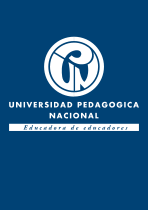Subjetividad, cuento y ciudad. Preguntas y trayectos de sentido por dos cuentos de la narrativa colombiana reciente.

Citación
Fecha
2006-01-27Autor
Jiménez Camargo, Camilo Enrique
Enlace al recurso
https://revistas.pedagogica.edu.co/index.php/RF/article/view/10189Palabras claves
Teoría del cuento
Cuento colombiano
Narrativas y ciudad
Sujetos y forma y lenguajes urbanos
Keyword
Short story theoryColombian short story
Narratives and city
Subjects
Urban form and languages
Metadatos
Mostrar el registro completo del ítemResumen
La metáfora de artefacto verbal de un "mundo esférico" en movimiento, permite articular una reflexión comprensiva del cuento como género de la narrativa literaria, como expresión de la cultura escrita y como práctica discursiva de producción del significado sobre la ciudad. De este modo, se asumen como punto de partida algunos referentes teóricos y metodológicos sobre la comprensión de la creación artística del relato literario para abordar la lectura de dos textos de la narrativa colombiana: "Instrucciones para morir con papá" (1994) de Óscar Collazos, y "El castillo invisible" (1991) de Daría Ruiz Gómez. Con la lectura de sus estratos narrativo, estilístico y semántico, la interpretación explora la construcción del significado que para las ciudades colombianas tiene la "espiritualidad de muerte" que imponen el sicariato y el arribismo delincuencial como fenómenos perversos y persistentes de socialización, movilidad y destrucción de la juventud. Al vincular el concepto de forma artística narrativa con el de forma urbana, que proviene de la sociología de los movimientos sociales, el cuento pasa a ser considerado un territorio partícipe de la construcción simbólica de lo urbano y, por consiguiente, un escenario de disputa por el significado de la ciudad contemporánea.
Abstract
The metaphor of a verbal handicraft of a moving "spherical world" lets us articulate a comprehensive reflection about the short story as a gender of literary narrative, as an expression of written culture and as a discursive practice of meaning production about city. Therefore, in this paper as a starting point, some theoretical and methodological referents about interpretation of artistic creation of literary narration are assumed, in order to consider the reading of a couple of Colombian narrative texts: "Instrucciones para morir con papá" written by Oscar Collazos in 1994, and "El castillo invisible" written by Daría Ruiz Gómez in 1991. According to the reading of their narrative, stylistic and semantic strata, the interpretation explores the construction of meaning that has the "spirituality of death" concept in Colombian cities, this spirituality implies and imposes hired assassination and delinquent opportunism as perverse and persistent phenomena of socialization, displacement and destruction of youth. By linking the concept of artistic narrative form with the concept of urban form, which arises from the sociology of the social movements, the short story starts being considered as a participating ground of symbolical urban construction and, therefore, a dispute scenery over the meaning of contemporary city.
Editorial
Editorial Universidad Pedagógica Nacional
Fuente
Colecciones
- Revista Folios [571]
